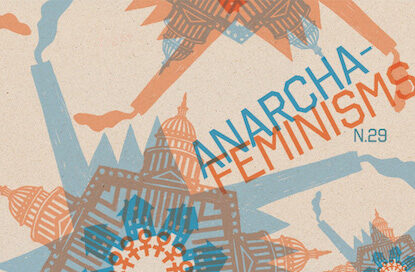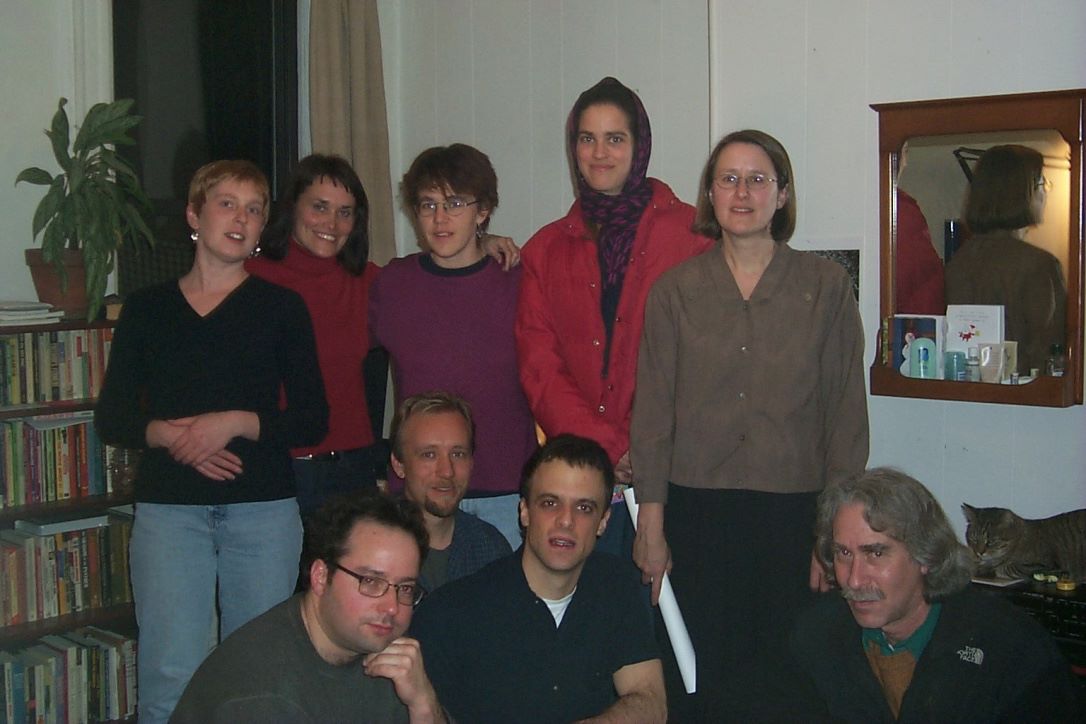Rapid policy changes, funding shifts and cuts, spikes in hate crimes, inflammatory rhetoric, corrupt democratic processes, and international etiquette blunders characterize the current political situation in the United States. Since the new regime assumed power, the immediate dangers to people of color, immigrants, queer folks, and the poor have escalated. We respond with the urgency of firefighters, racing from hot spot to hot spot, putting out flames where they threaten to consume our communities. We remain on constant high alert to respond to the next hate crime, the next anti-immigrant raid, the next attack on the planet.
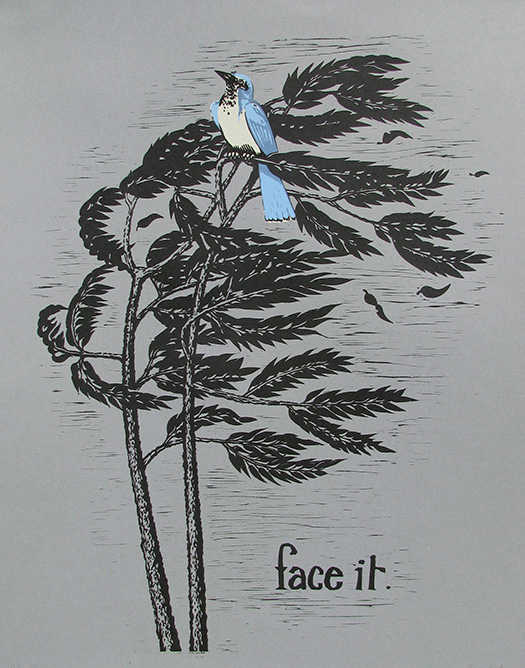
In these moments of urgency, it can feel as if we will never be able to do enough—as if our long-term campaigns are too slow to develop, our reach too short. How do we respond? Does this cycle require us to drop everything in order to react? Must we abandon our own more proactive, visionary agendas, our long-term strategic thinking, our imagining and pre-figuring of alternatives to the existing society? Let us remember that none of this appeared just this year, out of nowhere. Capitalism, war, racism, fascism, xenophobia, misogyny, and other forces of oppression have long been shaping the terrain in which we fight. If we neglect our own aspirations, then we’ve already lost.
#PerspectivesonAnarchistTheory
The Fourth Star: The New Junior Wobblies and the Next Generation of Union Militants, by Sadie Farrell and M.K. Lees
Several factors played into our collective decision not to run a print issue of Perspectives on Anarchist Theory for the current year. We sincerely thank all inquiries and submissions sent for what was hoped to be an issue on Play. A call for submissions for a Beyond The Crisis print issue of Perspectives (2018) is here.
This is an article written by two Wobblies in response to our call for Play essays. These organizers bridge the gap between play and the practice of organizing skills via educational skits and fun activities led by the New Junior Wobblies, the young members of the Industrial Workers of the World (IWW).
The IWW globe logo holds three stars representing Education, Organization and Emancipation. This article looks at Recreation – a fourth star – from challenging uneven relations of power, to making joy central to organizing against capitalism, regardless of age.
Shortly after a wave of government repression and internal splits nearly destroyed the Industrial Workers of the World (IWW) as a functioning labor organization, a group of Wobblies felt the immediate need to find new ways to raise the next generation of revolutionary unionists. As a part of solidarity support for striking IWW coal miners in Colorado, children of union members were invited to join an IWW organization of their own. These Wobbly kids formed “locals” to organize support for their striking parents, and alongside them, develop a rudimentary understanding of the world and how they might soon be a part of organizing to change it. To the IWW tripartite motto, “Education, Organization, Emancipation” they added “Recreation,” and in 1927, the Junior Wobblies Union was born.
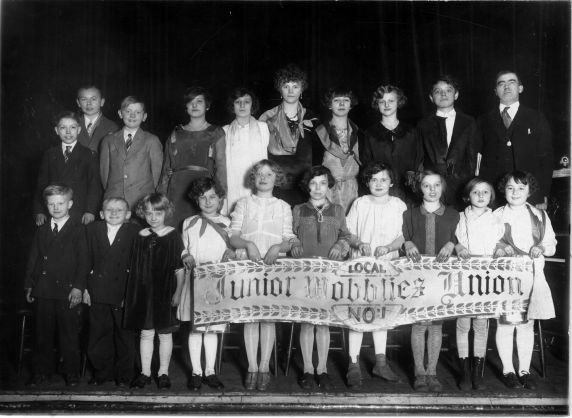
Radical Language in the Mainstream, by Kelsey Cham C.
This essay appears in the current issue of Perspectives on Anarchist Theory (N. 29), available here, from AK Press!
As a person who did not come to radical perspectives from academia, I’ve had quite the challenge trying to find community with people whose politics I respect.
I grew up in the suburb of Newton, Surrey, territory of the Katzie, Kwantlen, Semiahmoo and Tsawwassen peoples. I was an athlete and last-minute procrastinator who never understood why school should be taken seriously. Though I read newspapers every day, I didn’t have the words to describe the injustices I could see and feel. My lack of trust in the school system, and my dwindling trust in the politics of high level sports led me to believe I didn’t need validation from institutions. In grade 8, I started skipping class to find freedom. A couple of years later I found myself getting into hard drugs and failing classes. Eventually, I failed out of high school completely and was pretty proud about it.
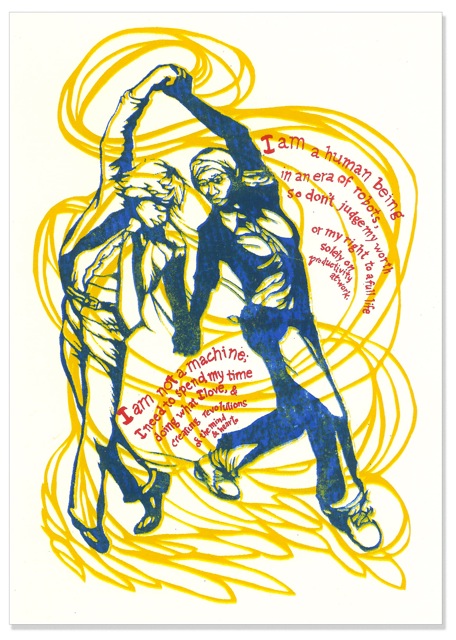
More than a missing diploma, more than my struggle with addiction, my biggest barrier to finding community in radical circles was a lack of exposure to their social expectations. I found very little compassion and support, and was often met with harsh judgment. Coming into these communities, I felt not smart enough and like an outcast. It took me years to understand the everyday language used in radical activist communities. Some words were long, some were short, but everyone said these words so casually I thought I would come across as stupid to ask what they meant. I’d go to talks and workshops, and some really smart dude would talk for an hour and then open up the space for questions. I remember feeling so lost by the jargon that by the end, I didn’t even know what the talk had been about. Clearly, I wasn’t going to ask the questions running around in my brain. “What do you mean by colonization?” “What is queer theory?” “Who is Marx!?” “Why are you speaking to us like my boring geography teacher?”
Indigenist Intersectionality: Decolonizing an Indigenous Eco-Queer Feminism and Anarchism, by Laura Hall
This essay appears in the current anarcha-feminisms issue of Perspectives on Anarchist Theory (N. 29), available here from AK Press! Laura received an Institute for Anarchist Studies writing grant to complete this piece.
The violence enacted against Indigenous women and Two-Spirit/LGBTQ people evokes deep questions about the intent and impact of colonization in a Canadian settler and state context. The horrors of colonial violence—bodies were violated and abandoned at the sides of highways, in ditches, in rivers—tell stories of the vital importance of Indigenous women’s leadership, their warriorhood, their gifts and their medicines, and also of the centrality of gendered freedom and fluid belonging in Indigenous cultures. It is a system of colonization that seeks to erase and subsume these realities and to replace Indigenous truth with illusions of our weakness. We are at a pivotal moment now as state and settler voices seek to understand what is needed, and it is a pivotal moment best informed by threads of anarchist and feminist thought woven within Indigenous worldviews. Vital intersections are made between gender and Indigeneity because the conversation is always in danger of being rerouted by policing and state voices, as well as settler voices.1 The work that Indigenous women and Two-Spirit/LGBTQ people do on the ground—to renew our connections to culture, to renew the innovations and economies of our nations—needs more support in every way, from allies across intellectual lines.
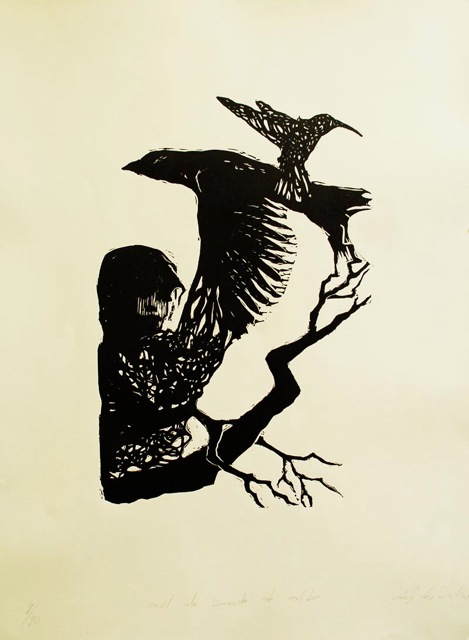
Abolishing the “Psy”-ence Fictions: Critiquing the Relationship Between the Psychological Sciences and the Prison System, by Colleen Hackett
This essay appears in the current anarcha-feminisms issue of Perspectives, N. 29, available here, from AK Press!
Tiana is crying. She walks into the room, a large, powerful woman wearing a bland ensemble of a faded green top with similarly colored pants. The silent tears on her face are enough to quiet the many scattered conversations happening among us. Many of us try to make eye contact with Tiana, waiting for her to tell us what is wrong. She doesn’t speak. She doesn’t look at anyone. She sits and stares.
We’re all sitting in a classroom in a women’s prison. The space is filled with remedial educational materials for GED students, collages with magazine cutouts of models and vacation getaways, and clichéd motivational posters that inspire the incarcerated to become “ambitious” and “dedicated.” In the moments of silence that follow Tiana’s entrance, I’m reminded of the poster on the wall that lists the amendments to the US Constitution. On this poster the legendary constitutional change, the thirteenth amendment, only includes the part that formally abolishes slavery and does not include the part that says, “Except as a punishment for crime whereof the party shall have been duly convicted.” Every time I encounter suffering in that room, including my own, I remember that sterilized, whitewashed version of history hanging on the wall and cringe. And I rage, quietly.
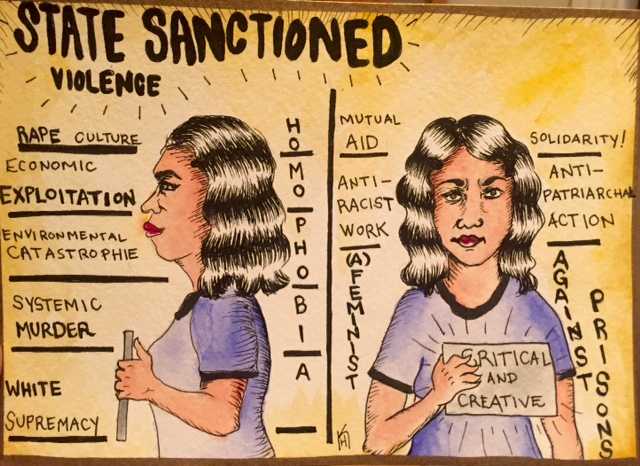
Feminism … Anarchism … Anarchafeminism, by Cindy Crabb
This three part piece by Cindy Crabb appears in the Anarcha-Feminisms issue of Perspectives on Anarchist Theory (N.29) available from AK Press.

Anarcha-Feminisms, Introduction
by the Perspectives Collective
This is the introduction to the anarcha-feminisms issue of Perspectives on Anarchist Theory (N.29). The whole issue is available again from AK Press here! Ok, editorial collective. Let’s talk this through. So, what are anarcha-feminisms and why do they need their own Perspectives issue? … Read more
Listening for a Multiplicity of Quiet Rumors Within the Anarcha-Feminist Archive: A Review of Quiet Rumors: An Anarcha-Feminist Reader, New Edition (AK Press, 2012), by Raeanna Gleason-Salguero

In their 1971 manifesto, “Anarcha-Feminism: Two Statements,” the Red Rose and Black Maria Black Rose Anarcho-Feminists define anarchism as “the affirmation of human freedom and dignity expressed in a negative, cautionary term signifying that no person should rule or dominate another person,” and they encourage libertarian socialist feminists to cultivate “all the groovy things people can do and build together, once they are able to combine efforts and resources on the basis of common interest, rationality, and creativity” (15). In a radical response to the repressive, violent, and “pathological structure” of the State, they conclude this manifesto with a demand for “ALL POWER TO THE IMAGINATION!” (17) Anthologized within the Dark Star Collective’s Quiet Rumors: An Anarchist-Feminist Reader, the Red Rose and Black Maria Black Rose manifesto opens the collection as a reminder of the need to be ever creative in our feminist approaches. Also, to collectively imagine and manifest complex transformations in how people might relate to one another outside the crushing structures of power and hierarchical notions of human value.
An Appeal from Noam Chomsky: Support Radical Writing and Publishing
Happy Birthday Noam! In a time when money and power are concentrated into ever-fewer hands, the Institute for Anarchist Studies (IAS) stands out. For two decades, the IAS has been providing grants to radical organizers and thinkers, allowing them to take time to reflect and … Read more
Staying Power: The Institute for Anarchist Studies, Twenty Years Running, by Michelle Renee Matisons
Regarding the earliest days of the IAS, the story is quite simple. I was living in Greenpoint, Brooklyn when Chuck Morse called me to ask if I’d like to work with him on a new project. He explained his idea for an organization that would … Read more


